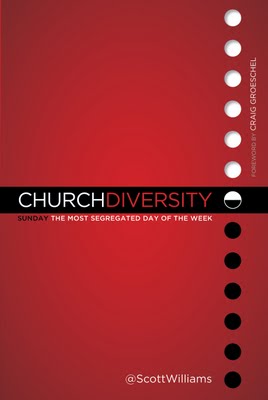Scott Williams is a pastor, ministry consultant, social media guru, and champion of diversity. Church Diversity: Sunday the Most Segregated Day of the Week is his first book. Recently, Williams served as Campus Pastor of the Northwest Oklahoma City Campus of LifeChurch.tv, which grew to an average weekly worship attendance of over 3,500 during his tenure. Prior to entering pastoral ministry, he gained professional experience in his work as a prison warden (serving as one of the youngest wardens in the country in his mid-twenties) and efforts on behalf of the Republican Party (serving, among other capacities, as one of the first black delegates to the Republican National Convention from the state of Oklahoma). To connect with Williams, read his blog, watch him on YouTube, follow him on Twitter (you can also read how his blogging and tweeting about blogging influenced my understanding of its place in worship), or friend him on Facebook.
Book Basics
 Church Diversity: Sunday the Most Segregated Day of the Week was inspired by Martin Luther King Jr.’s remark that, “We must face the sad fact that at the eleven o’clock hour on Sunday morning when we stand to sing, we stand in the most segregated hour in America.” Williams relies heavily on Dr. King’s work, including devoting the better part of a chapter to King’s “Paul’s Letter to American Christians, November, 4, 1956,” referencing his “I Have a Dream” speech, sharing stories of his ministry, suggesting churches observe the federal MLK holiday, and proposing the church begin celebrating Church Diversity Week (the inaugural week will begin Friday, January 13, 2012) as a way of moving toward Dr. King’s dream.
Church Diversity: Sunday the Most Segregated Day of the Week was inspired by Martin Luther King Jr.’s remark that, “We must face the sad fact that at the eleven o’clock hour on Sunday morning when we stand to sing, we stand in the most segregated hour in America.” Williams relies heavily on Dr. King’s work, including devoting the better part of a chapter to King’s “Paul’s Letter to American Christians, November, 4, 1956,” referencing his “I Have a Dream” speech, sharing stories of his ministry, suggesting churches observe the federal MLK holiday, and proposing the church begin celebrating Church Diversity Week (the inaugural week will begin Friday, January 13, 2012) as a way of moving toward Dr. King’s dream.
While the book relies more heavily upon Dr. King than any other source, it tells three important stories: the current reality of diversity (or the lack thereof) in the American church, the current reality of diversity in our country (especially as evidenced in the workplace), and his own life experiences with diversity and helping those entities within his sphere of influence be more intentional and successful with diversity (prison, politics, and church). At its best, Church Diversity reminds the church that while it has made considerable progress, it lags behind the culture at large and God’s ideal. At its worst, the text reads like a group of extended block quotes supplemented by basic commentary that does little more than summarize the quoted material. Individual and groups alike will benefit from two resources provided for each chapter: “challenge questions” within the text and short online videos.
So What?
In the concluding chapter, Williams walks through his ABC formula: Assess –> Believe –> Change. In the assessment portion (p.169-175), he offers the following questions:
Self-Assessment
- What is my history in dealing with issues of race and ethnicity
- How has racial prejudice reared its face in my life?
- Do I have genuine relationships with people of different races and ethnicities?
Church Assessment
- Is ethnic diversity represented at the highest level within my church?
- Are recruitment and hiring practices for staff, as well as volunteer placement strategies, sensitive to diversity?
- Does someone from the non-majority culture of my church share the pulpit?
Based on these questions, how well are you doing with diversity? What about your congregation?
Scott Williams. Church Diversity: Sunday the Most Segregated Day of the Week. New Leaf Press, 2011. ISBN: 9780892217038.
